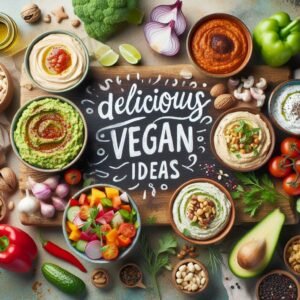When it comes to vegan cooking, the focus is on plant-based ingredients, which means excluding animal products from the recipes.
This culinary approach embraces creativity and nutrition, offering a wide range of delicious and cruelty-free alternatives to traditional dishes.
Whether you’re a long-time vegan or just curious about incorporating more plant-based meals into your diet, vegan cooking has something to offer for everyone.
The Benefits of Vegan Cooking

Vegan cooking is not only about following a specific diet; it is a lifestyle choice that has numerous benefits. By choosing to cook and eat vegan meals, you are making a conscious and compassionate decision that positively impacts your health, the environment, and animal welfare.
One of the primary benefits of vegan cooking is its focus on plant-based ingredients. Fruits, vegetables, legumes, whole grains, nuts, and seeds are rich in essential nutrients, vitamins, and minerals. By incorporating these ingredients into your meals, you can ensure a well-rounded and balanced diet.
Another advantage of vegan cooking is its positive impact on the environment. Animal agriculture is a significant contributor to greenhouse gas emissions, deforestation, and water pollution. By choosing plant-based alternatives, you can reduce your carbon footprint and help preserve our planet for future generations.
Furthermore, vegan cooking promotes animal welfare by eliminating the use of animal products. By opting for cruelty-free alternatives, you are taking a stand against the exploitation and suffering of animals. Vegan cooking allows you to enjoy delicious meals without compromising your values.
Exploring Vegan Culinary Techniques

Vegan cooking is not limited to salads and steamed vegetables. It offers a wide range of culinary techniques that can transform plant-based ingredients into mouthwatering dishes. Here are a few techniques commonly used in vegan cooking:
1. Substitution
Substitution is a key technique in vegan cooking. It involves replacing animal-based ingredients with plant-based alternatives. For example, you can use tofu or tempeh as a substitute for meat, and coconut milk or almond milk instead of dairy milk. With a little creativity, you can recreate your favorite recipes without sacrificing flavor or texture.
2. Flavor Pairing
Flavor pairing is an essential aspect of vegan cooking. By combining complementary flavors, you can enhance the taste of your dishes. Experiment with herbs, spices, and seasonings to create unique and flavorful combinations.
For example, try adding fresh basil and sun-dried tomatoes to your pasta for a burst of Mediterranean flavors.
3. Plant-Based Protein Sources
Protein is an essential nutrient in any diet, and vegan cooking offers a variety of plant-based protein sources. Legumes, such as lentils, chickpeas, and black beans, are excellent sources of protein and can be used in a wide range of dishes, from soups to burgers. Tofu, tempeh, and seitan are also popular protein alternatives for vegan cooking.
Delicious Vegan Recipe Ideas

Now that you’re familiar with the benefits and techniques of vegan cooking, here are a few delicious recipe ideas to inspire your culinary adventures:
1. Vegan Lentil Curry
This hearty and flavorful curry is made with red lentils, coconut milk, and a blend of spices. Serve it with steamed rice or naan bread for a satisfying meal.
2. Chickpea Salad Sandwich
A vegan twist on a classic sandwich, this recipe features mashed chickpeas mixed with vegan mayo, mustard, and fresh vegetables. Serve it on whole grain bread for a nutritious and filling lunch option.
3. Vegan Chocolate Avocado Mousse
Indulge your sweet tooth with this creamy and decadent dessert. Made with ripe avocados, cocoa powder, and a touch of maple syrup, this mousse is a guilt-free treat.
These are just a few examples of the countless delicious vegan recipes available. Whether you’re cooking for yourself, your family, or hosting a dinner party, vegan cooking offers a world of possibilities.
In Conclusion
Vegan cooking is a culinary journey that embraces creativity, compassion, and conscious eating. By exploring plant-based ingredients and incorporating vegan techniques into your cooking, you can enjoy delicious meals while making a positive impact on your health, the environment, and animal welfare.
So why not give vegan cooking a try and discover the joy of compassionate and flavorful eating?
